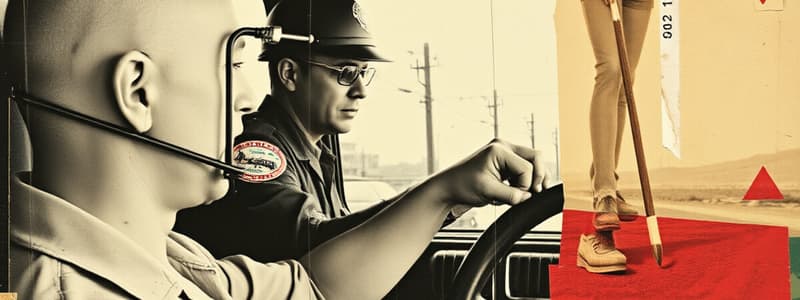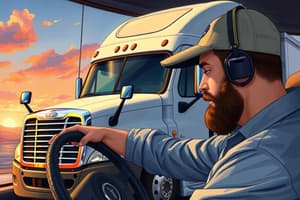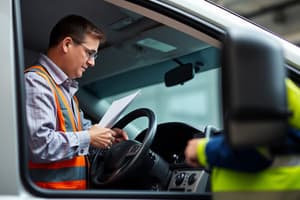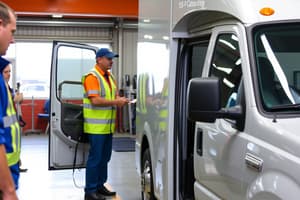Podcast
Questions and Answers
What is the most important reason for doing a vehicle inspection?
What is the most important reason for doing a vehicle inspection?
Safety for yourself and for other road users.
What things should you check during a trip?
What things should you check during a trip?
Instruments, Air Pressure Gauge, Temperature Gauges, Pressure Gauges, Ammeter/Voltmeter, Mirrors, Tires, Cargo, Lights.
Name 7 key steering system parts.
Name 7 key steering system parts.
Tie Rod, Steering Column, Gear Box, Reservoir, Steering Knuckle, Draglink, Spindle.
Name some suspension system defects.
Name some suspension system defects.
What three kinds of emergency equipment must you have?
What three kinds of emergency equipment must you have?
What is the minimum tread depth for front tires and for other tires?
What is the minimum tread depth for front tires and for other tires?
Name 7 things you should check on the front of your vehicle during a walk-around inspection.
Name 7 things you should check on the front of your vehicle during a walk-around inspection.
What 4 things should wheel bearing seals be checked for?
What 4 things should wheel bearing seals be checked for?
How many red reflective triangles should you carry?
How many red reflective triangles should you carry?
How do you test hydraulic brakes for leaks?
How do you test hydraulic brakes for leaks?
Why put the starter switch key in your pocket during the pre-trip inspection?
Why put the starter switch key in your pocket during the pre-trip inspection?
Why should you back towards the driver's side?
Why should you back towards the driver's side?
If stopped on a hill how can you start moving without rolling back?
If stopped on a hill how can you start moving without rolling back?
When backing, why is it important to use a helper?
When backing, why is it important to use a helper?
What's the most important hand signal that you and the helper should agree on?
What's the most important hand signal that you and the helper should agree on?
What are two special conditions where you should downshift?
What are two special conditions where you should downshift?
When should you downshift automatic transmissions?
When should you downshift automatic transmissions?
Retarders keep you from skidding when the road is slippery?
Retarders keep you from skidding when the road is slippery?
What are the two ways to know when to shift?
What are the two ways to know when to shift?
How far ahead does the manual say you should look?
How far ahead does the manual say you should look?
What are the two main things to look for ahead?
What are the two main things to look for ahead?
What is your most important way to see the sides and rear of your vehicle?
What is your most important way to see the sides and rear of your vehicle?
What does communicating mean in safe driving?
What does communicating mean in safe driving?
Where should your reflectors be placed when stopped on a divided highway?
Where should your reflectors be placed when stopped on a divided highway?
What 3 things add up to total stopping distance?
What 3 things add up to total stopping distance?
If you go twice as fast, will your stopping distance increase by two or four times?
If you go twice as fast, will your stopping distance increase by two or four times?
Empty trucks have the best braking?
Empty trucks have the best braking?
What is hydroplaning?
What is hydroplaning?
What is black ice?
What is black ice?
How do you find out how many seconds of following distance space you have?
How do you find out how many seconds of following distance space you have?
If you are driving a 30-foot vehicle at 55 mph how many seconds of following distance should you allow?
If you are driving a 30-foot vehicle at 55 mph how many seconds of following distance should you allow?
You should decrease your following distance if somebody is following too closely?
You should decrease your following distance if somebody is following too closely?
If you swing wide to the left before turning right, another driver might try to pass you on the right.
If you swing wide to the left before turning right, another driver might try to pass you on the right.
Flashcards are hidden until you start studying
Study Notes
Vehicle Inspection and Safety
- Conduct inspections for safety of yourself and others on the road.
- During trips, check instruments, air pressure, temperature gauges, mirrors, tires, cargo, and lights.
Steering and Suspension Systems
- Key steering components include tie rod, steering column, gear box, reservoir, steering knuckle, draglink, and spindle.
- Common suspension defects: cracked spring hangers, broken leaves, leaking shock absorbers, and faulty air suspension.
Emergency Equipment Requirements
- Must carry fire extinguishers, spare electrical fuses, and warning devices for parked vehicles.
Tire Regulations
- Minimum tread depth: 4/32 inch for front tires, 2/32 inch for other tires.
Pre-trip Inspection Checks
- Inspect front axle, steering system, windshield, wipers and blades, lights, and reflectors.
Wheel Bearing Maintenance
- Check wheel bearing seals for rips, tears, cracks, and leaks.
Emergency Supplies
- Carry three red reflective triangles for roadside emergencies.
Brake System Testing
- Test hydraulic brakes for leaks by checking pads, shoes, hoses, and reservoir for brake fluid.
Safe Inspection Practices
- Keep the starter key in your pocket during inspection to prevent vehicle rolling.
Driving Techniques
- Back towards the driver’s side for better visibility.
- On hills, use the parking brake or accelerate to avoid rolling back.
Importance of Helpers
- Use a helper when backing up to supplement vision and provide direction.
- Agree on clear hand signals; the most important is a signal to stop.
Downshifting and Speed Management
- Downshift when going into a curve or downgrade.
- Automatic transmissions should also downshift in similar conditions.
Shifting and Distance Awareness
- Shift based on engine and road speed; look 12 to 15 seconds ahead for hazards.
Watch for Traffic Changes
- Monitor traffic and changing road conditions.
- Utilize mirrors for expanded visibility around the vehicle.
Communication in Driving
- Communicate intentions to promote safety for yourself and others.
Reflector Placement
- When stopped on a divided highway, place reflectors at 10, 100, and 200 feet towards approaching traffic.
Stopping Distance Components
- Total stopping distance is the sum of perception, reaction, and braking distances.
Speed and Stopping Distance Relation
- Stopping distance increases by four times if speed doubles.
Truck Braking Capability
- Empty trucks do not have better braking capabilities; this statement is false.
Hydroplaning and Black Ice
- Hydroplaning occurs when tires lose traction over water.
- Black ice is a thin layer of ice that allows visibility of the road underneath.
Following Distance Calculations
- Measure following distance by timing seconds between passing a marker and the vehicle ahead.
- For a 30-foot vehicle at 55 mph, maintain a 4-second following distance.
Maintaining Safe Following Distance
- Increase following distance if another vehicle is tailgating; do not decrease it.
Turning Awareness
- Swinging wide to the left before a right turn can lead to other drivers trying to pass on the right.
Studying That Suits You
Use AI to generate personalized quizzes and flashcards to suit your learning preferences.




